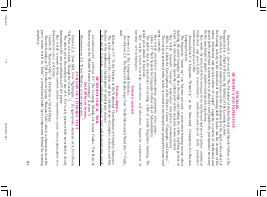SUMMARY METHODICS AND EXPERIENCE
Kupirova E.A., Suvorova E.P. The Fonnation of the Intellectual and Speech Culture is the Prerequisite for a Pupil to Become the Subject of the Learning Activity.
The article is devoted to methodic basics of the development of the pupil as the subject of the learning activity, to the fonnation of the learning skill. It looks into the structure of the notion "intellectual and speech culture of a pupil", suggests a system of intellectual and speech skills (analytical, reconstructive, productive) and justifies the prerequisites necessary for the enrichment of pupil's cognitive and speech experience.
Key words: the subject of the learning activity; intellectual and speech culture; analytical intellectual and speech skills; reconstructive intellectual and speech skills; productive intellectual and speech skills.
Artamoshkina E.A. Linguistic "Warm-Up" as the Structural Component of a Russian
Language Lesson.
The linguistic "warm up" can become not only a motivation-forming means when studying the native language but also the single start uniting the whole teaching process in school. The article dwells upon the content part of this necessary lesson element.
Key words: linguistic "warm-up"; motivation; intersubject communications.
Miller A.L. About the Development of the Elective Course "Geography and Literacy".
The exercises presented in the article are aimed to teach pupils use geographic names and terms correctly.
Key words: intersubject communications; geography; place names.
Dutko N.P. Web System for Linguistic Follow-On of Schoolchildren.
The author shares the experience of creating a hub of remote linguistics learning. The article gives details of his work.
Key words: remote learning; motivation; self-education; linguistic component of learning; web technologies.
Didactic material
Aksenova L.A. The Compound Sentence.
Novichkova E.S. The Ways of Introducing a New To-Be-Memorized Word (the 7th Grade, end).
Discuss, dispute...
Babaitseva V.V. To the Defense of the Traditional Classification of Complex Sentences.
The article compares the classic and new classifications of complex sentences and lists the pros of the traditional classification of subordinate clauses.
Key words: systematic approach; subordinate sentences; prop and demonstrative words.
METHODOLOGICAL MAIL
Levushkina O.N., Glebova Z.V. The Learning Module for Senior Grades "The Role of Borrowings in the Modern Russian Language" (Lesson 3).
Such different lessons...
Khachaturyan A.S. "Every Word as a vivid expression..."
ANALYSIS OF LITERARY TEXT
Panova E.A. "Now Mill, Now Nightingale..." (Linguo-poetic Analysis of A. Fet's Poem "The Pine is So Dark, Though the Crescent...").
The article gives the analysis of one of A. Fet's early poems which nevertheless clearly demonstrates the core peculiarities of Fet's poetry.
Key words: semantic fields; symbol; motive; oppositions; space; time organization; two dimensions of sense; syncretism .
Venditti M. "Russian Girls" by Derzhavin: a Versed Dance.
The article analyses G.R. Derzhavin's poem "Russian Girls" which is characteristic of the poet's artistic work: he "hides" a complicated multi-layer composition behind the seeming simplicity.
m
04/10/2010, 14:21
Key words: art work; quarchoree; anacreontic poetry; "verbal dance".
Romanov D. A. Stylistic Traditions of L.N. Tolstoy in A.I. Solzhenitsyn's Story "One Day of Ivan Denisovich": Linguistic Image of the Character.
The continuity link between the idiostyles of L.N. Tolstoy and A.I. Solzhenitsyn is not exhausted with the story "One Day of Ivan Denisovich" however it is clearly seen in the image of the main character.
Key words: central aspects; large scale; similarity of approach; idiostyle.
LANGUAGE STUDIES
Kardanova K.S. Linguistic Picture of the World: Myths and Reality (end).
LINGUISTIC NOTES
Glazunov M. V. Means of Connection of Parts in Complex Sentences with Subordinate Clauses of Purpose.
The article is devoted to the core means of connection of parts in complex sentences with subordinate clauses of purpose among which the author distinguishes the simple conjunction so that (to), complex conjunctions in order to, instead of and phrase conjunctions so as to do, instead of. The peculiarities of meaning and use of each of the conjunctions, phrase conjunctions are detected by comparing them with other conjunctions and phrase conjunctions.
Key words: conjunction; connective word; phrase conjunction; disjointed conjunction; jointed conjunction.
Vinogradova E.M. Complex Sentences with the Meaning of Inclusion, Exclusion, Substitution and Gradation.
The article addresses structural and semantic features of complex sentences which do not fall into any of the modern syntactic classifications but are present in the language system and actively used in speech, i.e. sentences with conjunctions implying inclusion, exclusion and substitution.
Key words: complex sentence classification; syntactic model; semantic of inclusion, exclusion, substitution, gradation; quantum conjunctions.
Language and culture
Petrova N.E. Teacher, Educator, Schoolman, Pedagogue, Mentor, Tutor.
In the Year of the Teacher we'd like to remind our readers the relevant names for people working in our profession, how teachers were called for centuries and how they are called now.
Key words: defining dictionary; teacher; educator; pedagogue; schoolman; tutor; prestige of a profession.
ABROAD
Zelenin A. V. Tolstoy in Finland: Texts and Ideas.
The article analyses some aspects of how L. Tolstoy's ideas influenced the spiritual life of Finland at the end of the 19th and the beginning of the 20th century. Books by Tolstoy were among the first ones to be translated into Finish.
Key words: Finish literature; bibliography references; ethic topics; psychological realism.
LINGUISTIC HERITAGE
Ganiev Zh. V. D.N. Ushakov and Moscow Dialect.
The article analyses the destiny of all-Russian orthoepy as seen by the specialists in this field - D.N. Ushakov and L.V. Scherba. The author makes a conclusion regarding to what extent each of the disputing parties was right: the Old Moscow pronunciation has not become the basics for Russian orthoepy in future.
Key words: Old Moscow pronunciation; Russian orthoepy; the influence of Russian spelling on pronunciation.
CRITIQUE AND BIBLIOGRAPHY CONSULTATION
112
112ss.pmd 112 04/10/2010,14:21
Для дальнейшего прочтения статьи необходимо приобрести полный текст. Статьи высылаются в формате PDF на указанную при оплате почту. Время доставки составляет менее 10 минут. Стоимость одной статьи — 150 рублей.
